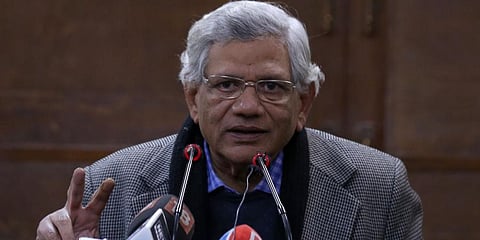EC MoU with Gujarat industral units 'coercive step towards compulsory voting', says CPI(M)
NEW DELHI: CPI(M) general secretary Sitaram Yechury has demanded the scrapping of the MOUs the Gujarat election commissioner has signed with industrial units to monitor the workforce's electoral participation while terming it a "coercive step towards compulsory voting".
Quoting news reports in a letter to the chief election commissioner of India, Yechury said it is "extremely shocking" that the poll panel had signed agreements with over 1,000 corporate houses in Gujarat to monitor the "electoral participation of their workforce" and publish on their websites or office notice boards the names of those who don't vote.
"We strongly feel that this is nothing short of being outrageous. The Election Commission has claimed that it is an attempt to address voter apathy, but the fact is that the move to name and shame those who do not vote is a coercive step towards compulsory voting," he said.
Quoting the report, the CPI(M) leader said that 233 MoUs have been signed monitoring the electoral participation of the workforce belonging to 1,017 industrial units.
"It is unfortunate that we have to remind you that right to vote is guaranteed by the Constitution of India under Article 326. Let us also remind you that in dealing with the mandatory voting right, the Supreme Court had asked the Centre to file a response. Response filed in 2015 by the Union Minister for Law and Justice had stated that if a regime of compulsory voting is introduced, it could result in the creation of an undemocratic environment in the country," he said.
Yechury further said the move by the poll panel of involving corporates in enforcing the right to vote as a fundamental duty is outright unconstitutional.
Apart from this, it further involves the corporates in the conduct of the elections in an already controversial background of anonymous corporate funding through Electoral Bonds. Further, in the current EVM machine counting process, the earlier practice of mixing the ballot papers no longer exists in practice. EVM counting gives transparently the voting pattern of each booth.
"This makes the workers being verified by this process of corporate supervision very vulnerable to intimidation and vindictive action. This makes a mockery of the secret ballot. We would, therefore, urge the Election Commission to set all controversy to rest by scrapping this reported move," he said.

